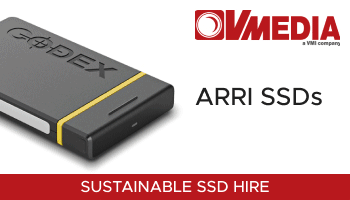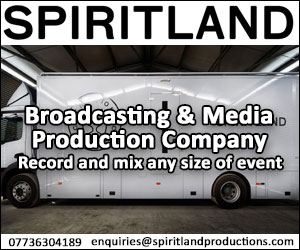Broadcast News
15/10/2015
Vortex Keeps On Top Of Industry Changes

Can you tell us a bit about the history of Vortex?
We established Vortex in 1987 which was the last time I had what I call a "proper job". Until then, I was running the Eastern Hemisphere office of a US company called Convergence Corporation that manufactured videotape editing equipment. We provided sales and technical support to distributors around the world, making sure everything – video recorders, vision mixers, and other devices – worked together.
It was on my travels where I came to realise that many of our distributors were producing their own solution for the "missing bits" in their various systems; the German company made an amplifier that the French needed and the French company made a SECAM transcoder that the Middle Eastern company needed and so on and it was here that the idea of Vortex – notionally Video and Other Related Technology for EXport came about.
In 1987, we took the plunge and founded Vortex. The key marketing tool was our "World-Famous Cookbook", an A5 binder of various pages of products grouped by type (Video, Audio, Infomatics, Time and Outside Broadcast). Immediately we had a huge range of products to which we added our own - and a ready-made distribution network from whom we both bought and sold. Our Applications Notes that clipped into the same Cookbook linked everything together.
From our first year, we won the BBC World Service Bush House CTA Tender for Audio Amplifiers, which amounted to the design, development and supply of 1,000 audio amplifiers through which all the signals into and out of Bush House passed. This was a joint collaboration between Hensmann Electronics in Germany, Comrex and Vortex, and the amplifiers were all still in service when Bush House closed in 2012.
Back to the present, you provide solutions to broadcast and AV users such as the ACCESS and LiveShot Codecs which rely on IP. How are these products being received and utilised as the industry makes the transition to IP?
In 1982, I travelled to China as part of a Broadcast Manufacturers Delegation to promote Convergence Editing systems. On the same trip were John and Lynn Cheney who ran Comrex. We got to know each other – and each other's products – and when we set up Vortex, they asked if we would look after Comrex's interests in this neck-of-the-woods – a strong relationship that lasts to this day.
Our friends at Comrex have been providing ways of getting broadcast audio over public networks since the 70s and using the Public Internet is the obvious next step after dedicated music lines, PSTN (normal telephone), ISDN and GSM. All the previous modes of sending audio back to the station use end-to-end connectivity – you dial a number and the connection is yours – and the only challenge was getting the audio in a suitable form to send over the particular connection. Using the public internet is different and whilst anyone can stream audio over an internet connection, there can be a significant delay – often many seconds whilst the stream is being buffered – because others are using the same data pipeline. This is no use for live broadcast and especially for two-way conversations; the more people online, the busier the internet becomes.
Comrex developed the industry-standard ACCESS Audio Codec specifically for contended IP connections providing 20kHz audio with extremely low delay (around 100mS) even using 4G/3G from crowded – and remote – locations. Its trick is not to demand too much of the connection by using as little data as possible, while still providing broadcast audio, to use forward error connection and error masking, dynamic jitter buffering, congestion avoidance and other techniques to ensure high-quality, low-delay audio streams seamlessly. So powerful are these algorithms that packet loss in excess of 25% is barely noticeable.
The latest development introduces multi-streaming to the ACCESS, developed for the LiveShot Video Codec, which lets users plug-in multiple dongles to stream over different data providers, providing bonding and diversity and even better reliability. The LiveShot Video Codec followed the ACCESS and provides two-way HD video and stereo audio, with the return video often used for teleprompting. There is also a two-way comms codec built in. It uses the same techniques developed for the ACCESS to provide ultra-low delay HD, even over poor connections, and has its own built-in diversity and bonding in a package weighing less than 1kg and consuming less than 7W.
To complement these, we developed the CallMe Internet Browser codec which lets contributors and guests get on-air without the need to download an application – or a reporter to turn up or come to the studio. MCC Multi-Codec Control lets users deal with their fleet of ACCESS and BRIC-Links from a single screen providing easy-view statistics and traffic-light indication of connection status. This was developed as part of our involvement with the BBC ViLoR Virtual Radio Project where we supplied and commissioned multi-channel ACCESS Codecs that run on servers remote from the studios themselves.
What about Unity Intercom and other smartphone applications?
As part of our range of telephone interfaces, we have a number of Bluetooth devices that interface with conventional intercom systems. Unity goes a step further, converting smartphones into Intercom Beltpacks that use IP to connect to server software running on a Mac. Our CallMe codec also runs on smartphones for live broadcasting but the common difficulty with using a smartphone is its external connectivity. Using the 4-pin mini-jack is the only viable connection and we have a low-cost mic/headset interface that lets users plug in professional microphones and headphones for broadcast, and a range of intercom headsets to complement Unity.
Clock and timing seem to play a big part in your activities. How did that come about and what are the latest developments?
Shortly after winning the Bush House Amplifier tender, we won the Bush House Timing contract. From that early supply of a triple Master Timing System, we have been involved in accurate timing and now time a significant part of the broadcast industry, as well as in airports, financial institutions, industrial sites and the UK Houses of Parliament. Our latest development is FLX – a virtual clock and timing system that uses low-cost HDMI screens to display clocks with hands, digital clocks and timers generated in a small interface that locks to NTP time over a network.
Vortex has been involved in the industry since 1987. What major developments have occurred or transformed the sector over the years?
What we see, especially over the last couple of years, is developments in consumer products that are becoming more innovative and seemingly easier to use. Love them or loathe them, smartphones have given people the opportunity to do things that couldn't be considered before their invention – often for free and the perception of cost has become distorted.
Having a computer in your pocket many times more powerful and much less expensive than the one we used to run Vortex in 1987 provides fantastic opportunities for new developments but the challenge for us is how to exploit it. Everything we make and handle is reliable and supportable, but costs money to develop, which does not easily match-up with all the "free stuff" out there. This is a challenge – monetising developments – but without upsetting the potential customer, and one we have in-hand.
Something that hasn't changed though is that back in 1987, we were all engineers, and today, unusually, we are still all engineers. I think this benefits the company in that we can actually "do" things which also benefits our customers with support and backup. We are still quite a team, and if the geek shall inherit the earth, then things at Vortex will continue to be absolutely fine – and hopefully, still fun.
We established Vortex in 1987 which was the last time I had what I call a "proper job". Until then, I was running the Eastern Hemisphere office of a US company called Convergence Corporation that manufactured videotape editing equipment. We provided sales and technical support to distributors around the world, making sure everything – video recorders, vision mixers, and other devices – worked together.
It was on my travels where I came to realise that many of our distributors were producing their own solution for the "missing bits" in their various systems; the German company made an amplifier that the French needed and the French company made a SECAM transcoder that the Middle Eastern company needed and so on and it was here that the idea of Vortex – notionally Video and Other Related Technology for EXport came about.
In 1987, we took the plunge and founded Vortex. The key marketing tool was our "World-Famous Cookbook", an A5 binder of various pages of products grouped by type (Video, Audio, Infomatics, Time and Outside Broadcast). Immediately we had a huge range of products to which we added our own - and a ready-made distribution network from whom we both bought and sold. Our Applications Notes that clipped into the same Cookbook linked everything together.
From our first year, we won the BBC World Service Bush House CTA Tender for Audio Amplifiers, which amounted to the design, development and supply of 1,000 audio amplifiers through which all the signals into and out of Bush House passed. This was a joint collaboration between Hensmann Electronics in Germany, Comrex and Vortex, and the amplifiers were all still in service when Bush House closed in 2012.
Back to the present, you provide solutions to broadcast and AV users such as the ACCESS and LiveShot Codecs which rely on IP. How are these products being received and utilised as the industry makes the transition to IP?
In 1982, I travelled to China as part of a Broadcast Manufacturers Delegation to promote Convergence Editing systems. On the same trip were John and Lynn Cheney who ran Comrex. We got to know each other – and each other's products – and when we set up Vortex, they asked if we would look after Comrex's interests in this neck-of-the-woods – a strong relationship that lasts to this day.
Our friends at Comrex have been providing ways of getting broadcast audio over public networks since the 70s and using the Public Internet is the obvious next step after dedicated music lines, PSTN (normal telephone), ISDN and GSM. All the previous modes of sending audio back to the station use end-to-end connectivity – you dial a number and the connection is yours – and the only challenge was getting the audio in a suitable form to send over the particular connection. Using the public internet is different and whilst anyone can stream audio over an internet connection, there can be a significant delay – often many seconds whilst the stream is being buffered – because others are using the same data pipeline. This is no use for live broadcast and especially for two-way conversations; the more people online, the busier the internet becomes.
Comrex developed the industry-standard ACCESS Audio Codec specifically for contended IP connections providing 20kHz audio with extremely low delay (around 100mS) even using 4G/3G from crowded – and remote – locations. Its trick is not to demand too much of the connection by using as little data as possible, while still providing broadcast audio, to use forward error connection and error masking, dynamic jitter buffering, congestion avoidance and other techniques to ensure high-quality, low-delay audio streams seamlessly. So powerful are these algorithms that packet loss in excess of 25% is barely noticeable.
The latest development introduces multi-streaming to the ACCESS, developed for the LiveShot Video Codec, which lets users plug-in multiple dongles to stream over different data providers, providing bonding and diversity and even better reliability. The LiveShot Video Codec followed the ACCESS and provides two-way HD video and stereo audio, with the return video often used for teleprompting. There is also a two-way comms codec built in. It uses the same techniques developed for the ACCESS to provide ultra-low delay HD, even over poor connections, and has its own built-in diversity and bonding in a package weighing less than 1kg and consuming less than 7W.
To complement these, we developed the CallMe Internet Browser codec which lets contributors and guests get on-air without the need to download an application – or a reporter to turn up or come to the studio. MCC Multi-Codec Control lets users deal with their fleet of ACCESS and BRIC-Links from a single screen providing easy-view statistics and traffic-light indication of connection status. This was developed as part of our involvement with the BBC ViLoR Virtual Radio Project where we supplied and commissioned multi-channel ACCESS Codecs that run on servers remote from the studios themselves.
What about Unity Intercom and other smartphone applications?
As part of our range of telephone interfaces, we have a number of Bluetooth devices that interface with conventional intercom systems. Unity goes a step further, converting smartphones into Intercom Beltpacks that use IP to connect to server software running on a Mac. Our CallMe codec also runs on smartphones for live broadcasting but the common difficulty with using a smartphone is its external connectivity. Using the 4-pin mini-jack is the only viable connection and we have a low-cost mic/headset interface that lets users plug in professional microphones and headphones for broadcast, and a range of intercom headsets to complement Unity.
Clock and timing seem to play a big part in your activities. How did that come about and what are the latest developments?
Shortly after winning the Bush House Amplifier tender, we won the Bush House Timing contract. From that early supply of a triple Master Timing System, we have been involved in accurate timing and now time a significant part of the broadcast industry, as well as in airports, financial institutions, industrial sites and the UK Houses of Parliament. Our latest development is FLX – a virtual clock and timing system that uses low-cost HDMI screens to display clocks with hands, digital clocks and timers generated in a small interface that locks to NTP time over a network.
Vortex has been involved in the industry since 1987. What major developments have occurred or transformed the sector over the years?
What we see, especially over the last couple of years, is developments in consumer products that are becoming more innovative and seemingly easier to use. Love them or loathe them, smartphones have given people the opportunity to do things that couldn't be considered before their invention – often for free and the perception of cost has become distorted.
Having a computer in your pocket many times more powerful and much less expensive than the one we used to run Vortex in 1987 provides fantastic opportunities for new developments but the challenge for us is how to exploit it. Everything we make and handle is reliable and supportable, but costs money to develop, which does not easily match-up with all the "free stuff" out there. This is a challenge – monetising developments – but without upsetting the potential customer, and one we have in-hand.
Something that hasn't changed though is that back in 1987, we were all engineers, and today, unusually, we are still all engineers. I think this benefits the company in that we can actually "do" things which also benefits our customers with support and backup. We are still quite a team, and if the geek shall inherit the earth, then things at Vortex will continue to be absolutely fine – and hopefully, still fun.
More Audio Visual Equipment Stories
22/11/2019
Pixel Artworks Creates Dynamic Set For Tour Of The ISL
Pixel Artworks was behind the creation of the dynamic set and show experience for the recent first world tour of The International Swimming League (IS
Pixel Artworks Creates Dynamic Set For Tour Of The ISL
Pixel Artworks was behind the creation of the dynamic set and show experience for the recent first world tour of The International Swimming League (IS
25/01/2016
dB Broadcast Completes ICC Installation
dB Broadcast has completed an installation project at the International Criminal Court (ICC) in The Hague. The project involved designing, installing
dB Broadcast Completes ICC Installation
dB Broadcast has completed an installation project at the International Criminal Court (ICC) in The Hague. The project involved designing, installing
16/11/2015
We Hear You. Make Sure They Can, Too.
You can have the best production chain equipment in the world, but if you have overlooked ensuring that your comms and SPGs – both critical components
We Hear You. Make Sure They Can, Too.
You can have the best production chain equipment in the world, but if you have overlooked ensuring that your comms and SPGs – both critical components
06/11/2015
Intercom Systems From Vortex
Vortex now stocks a full range of Intercom headsets, Bluetooth Interfaces and Beltpacks as well supplying Unity Intercom which uses smartphones, compu
Intercom Systems From Vortex
Vortex now stocks a full range of Intercom headsets, Bluetooth Interfaces and Beltpacks as well supplying Unity Intercom which uses smartphones, compu
15/10/2015
Vortex Keeps On Top Of Industry Changes
Can you tell us a bit about the history of Vortex? We established Vortex in 1987 which was the last time I had what I call a "proper job". Until then,
Vortex Keeps On Top Of Industry Changes
Can you tell us a bit about the history of Vortex? We established Vortex in 1987 which was the last time I had what I call a "proper job". Until then,
13/10/2015
Know Your Limit
As their UK representative, professional sound distributor, Raycom has announced the upgrade of Wisycom's popular MTP41 single battery miniature radio
Know Your Limit
As their UK representative, professional sound distributor, Raycom has announced the upgrade of Wisycom's popular MTP41 single battery miniature radio














